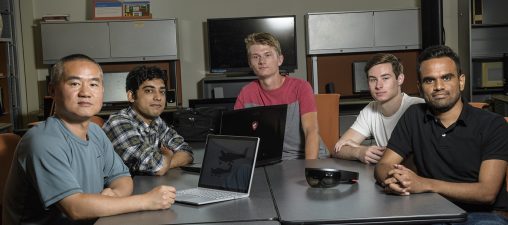
From left: Yong Pei, associate professor of computer science and engineering, and student researchers Miteshkumar Vasoya, Chris Rave, Logan Frank and Ashutosh Shivakumar. (Photo by Erin Pence)
Helping develop a pilotless “Air Uber” drone that could ferry medical supplies or emergency responders to disaster zones is the goal of a Wright State University computer science and engineering team.
The researchers are part of an industry and university group that was awarded a $2 million Ohio Federal Research Network grant in support of unmanned aerial vehicle research and development. The Wright State researchers, led by Yong Pei, associate professor of computer science and engineering, were awarded $150,000 for their part of the project.
“We want to move the UAV from a small-payload platform to make it a more meaningful, higher payload,” Pei said. “So we’re starting from an existing commercially available aircraft and trying to add new capabilities that will eventually enable it to be autonomous.”
Such an aircraft could be useful in disaster relief as well as surveillance in that the drone would be able to stay aloft for longer periods of time since there would be no human pilot.
And Pei said the drones could be used to deliver medical supplies to areas that pose a risk to aircraft and human pilots. Or, he said, you may want to send a team of first responders to a disaster area and cannot immediately find a pilot or enough pilots.
Small drones are already making an impact in the commercial sector, being used by the real estate and utility industries. And Amazon is working on developing a fleet of drones to deliver packages to customers.
But larger, unmanned drones that can carry passengers may also be the wave of the future. The city of Dubai in the United Arab Emirates, for example, has been testing an unmanned, self-flying taxi.
Pei said that while autopilot and other computer assistance have been in planes for a long time, going pilotless is “a totally different story.”
“The computer is going to take over,” he said. “The challenge will be very, very different.”
The lead partner in the Air Uber project is Persistent Surveillance Systems LLC based in Xenia. The company, which employs several Wright State graduates, is supplying a Cirrus SR22, a small, single-engine, fixed-wing airplane that can accommodate four passengers.
“And Persistent has some mature technology in an advanced stage of development,” said Pei.
As for Pei and his team of researchers, they are developing computer software that will enable the drone to detect and avoid other aircraft in the skies by using images and information from cameras and sensors on the aircraft.
“Computer science and computer engineering are taking a leading role in the transportation/aviation industry,” Pei said. “People want to shift more responsibility to the machines, the computers. Computer science is right in the center. That’s the most important part.”
Pei said the goal is to produce a prototype drone that can be demonstrated at the Air National Guard air show in Springfield next year. He said full-scale operation of such an Air Uber is likely several years away.
Ross McNutt, owner and chief technical officer of Persistent, said Wright State will be an essential part of the project and he is excited to have the Wright State researchers on the team.
“Seeing and avoiding other aircraft and hazards is an essential part of creating a remote and autonomous system capable of performing the missions we need,” he said. “We hope to make flying safer, more affordable and open to a much wider range of people through our efforts.”
A native of China, Pei earned a Ph.D. in electrical engineering from Rensselaer Polytechnic Institute in Troy, New York. He joined the faculty at Wright State in 2003. Pei and his student researchers already have experience in artificial intelligence.
Last year, an augmented reality system they designed that puts a “doctor in the house” to help recovering surgery patients manage pain without painkillers was a winner in the Ohio Opioid Technology Challenge. The researchers work at Wright State’s SMART Lab, which stands for Sustainable – Mobile – Autonomous – Real Time – Translational. It is located in Wright State’s Joshi Research Center.
Pei said aviation is a new frontier for him and his student researchers. But he said there are growing opportunities for computer scientists and computer engineers in the aviation industry.
“We’ve started to realize how important it is,” he said. “The important thing is for our students to get exposed to this. We want to get into this field.”
In addition to Persistent and Wright State, the other partners on the project include Ohio University, MacAir Aviation, Autonodyne LLC, MacNauchtan Development and Bosma Technical Services.
The funding was awarded under the Ohio Federal Research Network’s (OFRN) Sustaining Ohio’s Aeronautical Readiness and Innovation in the Next Generation (SOARING) initiative, which is designed to expand Ohio’s leadership in defense and commercial aerospace research, development and sustainment of unmanned air systems, personal air vehicles and logistics delivery air vehicles.
“Because of OFRN, we are now seeing groups of researchers from both the public and private sector working together with our federal partners to leverage Ohio’s research assets in ways that had never occurred before,” said Dennis Andersh, executive director of OFRN and the Wright State Research Institute.

 Wright State psychology team studies ways to identify fatigue in pilots, drivers
Wright State psychology team studies ways to identify fatigue in pilots, drivers  Wright State videographer Kris Sproles wins Regional Emmy and Ohio journalism award
Wright State videographer Kris Sproles wins Regional Emmy and Ohio journalism award  Wright State Boonshoft School of Medicine ranked among the nation’s best for 2024 by U.S. News
Wright State Boonshoft School of Medicine ranked among the nation’s best for 2024 by U.S. News  Exposing biotechnology
Exposing biotechnology  Wright State faculty member Dan Noel uses unique background to inspire new leaders
Wright State faculty member Dan Noel uses unique background to inspire new leaders 